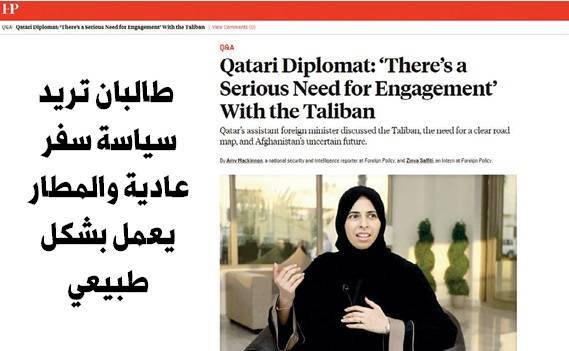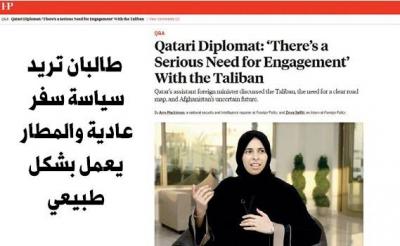Her Excellency Lolwa Al-Khater, Assistant Minister of Foreign Affairs and the spokesperson for the Ministry of Foreign Affairs, has urged the international community to work towards a clear roadmap in Afghanistan, stating that there is no need to recognize the Taliban at this moment, but a critical need to establish a relationship with them. In an interview with Foreign Policy magazine, she mentioned that Qatar has contributed through Qatari technical teams to the operation of Kabul Airport and facilitated evacuation operations from Afghanistan, with Doha conducting four flights from Afghanistan that carried 777 passengers of various nationalities. The American magazine highlighted Qatar's emergence as a key mediator in the Afghan crisis since the Taliban opened a political office in 2013, as Qatar hosted talks between the Trump administration and the Taliban that resulted in the Doha Agreement in February 2020, which set a timetable for the complete withdrawal of American forces. Since then, Qatar has played a significant role in the evacuation of foreign and Afghan nationals from Kabul in August, with approximately 60,000 people evacuated through Doha, which continues to serve as a major transit point for Afghan refugees awaiting resettlement.
How are the evacuation operations going? And what role is Qatar currently playing in this effort? The first objective was to reopen the airport, which has been achieved. There are Qatari technical teams still assisting at the airport and in several other matters. The airport is now operational and can receive commercial flights, whereas previously only the military side was functioning.
On the technical side, we also have contributions in the political aspect by enabling individuals wishing to leave the country to do so. This effort involves negotiations with the Taliban, receiving names on lists, vetting them, working on the ground, and completing the evacuation process. We have implemented four flights from Afghanistan that carried 777 passengers since August 31, which mostly included non-Afghan citizens as well as Afghan citizens.
How does the Taliban behave towards these discussions? They said they would allow free movement. Are they holding to that? Theoretically, they have never objected to this. To be perfectly fair, they have stated that they want normal travel policies: an airport operating normally, just like any other country. Therefore, this is the general goal, their declared intention. However, what does this mean? And how do they perceive it? This is part of the problem because they do not understand it. For example, airport security. They tell you, "We are responsible," but what does that mean? Armed individuals, but that is not all it takes to ensure security at the airport. Also, I must say, due to this chaos and perhaps the internal competition within the Taliban and its various factions, you sometimes feel like you are not speaking to one person, right? So you talk to one person, and then that person perhaps hasn’t informed the other. Therefore, everything with them needs consensus in one way or another.
This certainly delays matters. But generally, they realize: first, they need international recognition. Second, they want to show that they have indeed changed. This has manifested itself in various ways. For example, taking photos with some female doctors—they have done that. Taking pictures with the Afghan flag—they have done that. By the way, they have retained all the second-tier technocrats; they have been kept in government. The presidential palace has not asked anyone to leave.
Do you think they will continue with that? I mean, clearly, there is a lot of international focus on them now and on what type of government they will have. But do you think that after six months, after a year, they will adhere to these promises of having a different style of governance, hopefully more humanitarian than in the 1990s? We hope; we can only hope. So far, it seems there is a kind of learning experience, especially for those who were involved in the negotiations with the U.S. We have found them more open, let’s put it that way, compared to other Taliban members. They are more responsive than others; they understand better the importance of international relations.
I should say that part of our responsibility, and I am talking about the international community in general, is to reach a clear roadmap. That has not happened yet. What are we asking of the Taliban? I know many of us, including us, have issued statements regarding women’s education and about an inclusive government, but is there an internationally approved document that says, "This is what we expect from you. This is the timeline, and this is what you will get in return"? This has not happened yet, and it adds complexity to the already complicated situation.
Is Qatar playing a role in that? Are discussions ongoing about laying out a roadmap for the Taliban? We have had some discussions with the Taliban and other parties as well, including the U.S. So, with the Taliban, what we have had so far is significant discussions about forming an inclusive government, which took place before the announcement of the interim government. The interim government that was announced did not meet expectations, even our expectations, and we communicated that to them very clearly.
The message from our side that we conveyed, publicly and especially to the Taliban, is that "Qatar is a Muslim-majority country. Women are not forbidden from education. They are not prohibited from being part of the workforce." And not just in Qatar: you have Malaysia, Indonesia, and all the other Muslim-majority countries; they would be just a strange example.
If it concerns them from their perspective that Western nations are trying to preach to them. So what we try to convey is that we come from a Muslim country. We are trying to move forward on different paths; we encourage them to go and speak independently with Muslim scholars or imams about any other form of governance.
What are your thoughts on the conditionality of aid? Do you think this is effective? Does it affect the Taliban? There is an urgent need now as we discuss humanitarian aid. From the Taliban’s side, what they need very clearly is assistance; the country requires it. They are ready to receive aid and facilitate its entry without interference, and we have seen that in working with UN agencies. For example, the WHO has contacted us to help them deliver some medical supplies. And indeed, we did that through Kabul Airport. Part of our message to everyone is that we also need to think about the bigger picture because, according to the UN High Commissioner for Refugees, we are not prepared—Afghanistan is not ready—we will see waves of millions of refugees. And that will be a real crisis afterward. It’s not just about the 130,000 people safely evacuated from the country.
Kabul is the focus of a lot of international attention and journalists' focus. But what is the cohesion like within the Taliban? These messages around ensuring women’s education, will this message filter down to small cities and rural areas? This is a very good point. There are two things I want to mention here. First, concerning the cohesion issue, yes, there seem to be some contradictions all over the place. This may relate to leadership that may not be effective. It relates to the generational gap as well. Interestingly, it seems that the older generation has become somewhat wiser. They are actually expressing their concerns, saying they are worried about the younger generation’s non-compliance with some standards.
In Kabul itself, there seems to be a difference between provinces in terms of openness. Afghan society is also a very conservative society. Over the past two decades, there has been a struggle emerging from all the stories we receive and all the schools we help, so this struggle will continue, not just because of the new style of governance.
You have not reached a conclusion on recognizing the Taliban government yet.. what discussions are you having with your international partners regarding the recognition issue? We simply tell them that there is no need for recognition right now, but at the same time, there is a real need to establish a relationship with them. There should be some sort of commitment. I mean, the fact that U.S. Secretary of State Mike Pompeo signed an agreement in February 2020, and the other party in that agreement was actually the Taliban, with Mullah Abdul Ghani Baradar himself there alongside the Secretary of State. That was good at the time, right?
This does not mean endorsing their actions or their form of rule or anything or their values. It only means that they are dealing with them on very practical terms to achieve very important goals. Therefore, there is an urgent need to engage with them now, without necessarily recognizing them, and that is possible.




